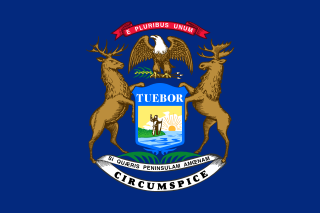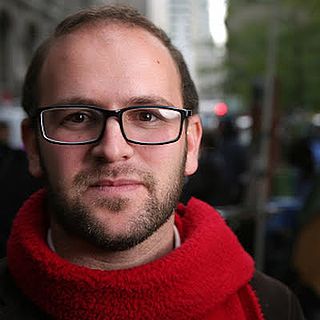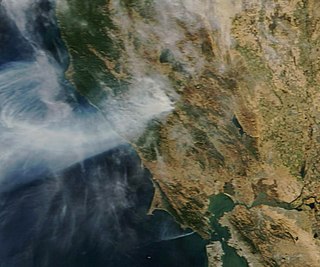
Michigan is a state in the Great Lakes region of the upper Midwestern United States. In the upper peninsula it has land borders with Wisconsin to the northwest, and in the lower peninsula with Indiana and Ohio to the south; it is also connected by Lakes Superior, Michigan, Huron, and Erie to the states of Minnesota and Illinois, and the Canadian province of Ontario. With a population of nearly 10.12 million and an area of 96,716 sq mi (250,490 km2), Michigan is the 10th-largest state by population, the 11th-largest by area, and the largest by area east of the Mississippi River. Its capital is Lansing, and its largest city is Detroit. Metro Detroit is among the nation's most populous and largest metropolitan economies. Its name derives from a gallicized variant of the original Ojibwe word ᒥᓯᑲᒥ, meaning "large water" or "large lake".

Port Huron is a city in the U.S. state of Michigan and the county seat of St. Clair County. The population was 28,983 at the 2020 census. The city is bordered on the west by Port Huron Township, but the two are administered autonomously.

Financial services are economic services tied to finance provided by financial institutions. Financial services encompass a broad range of service sector activities, especially as concerns financial management and consumer finance.

Accounts receivable, abbreviated as AR or A/R, are legally enforceable claims for payment held by a business for goods supplied or services rendered that customers have ordered but not paid for. The accounts receivable process involves customer onboarding, invoicing, collections, deductions, exception management, and finally, cash posting after the payment is collected. These are generally in the form of invoices raised by a business and delivered to the customer for payment within an agreed time frame. Accounts receivable is shown in a balance sheet as an asset. It is one of a series of accounting transactions dealing with the billing of a customer for goods and services that the customer has ordered. These may be distinguished from notes receivable, which are debts created through formal legal instruments called promissory notes.

Northern Ireland Water Limited is the main water company in Northern Ireland.

The government of Detroit, Michigan is run by a mayor, the nine-member Detroit City Council, the eleven-member Board of Police Commissioners, and a clerk. All of these officers are elected on a nonpartisan ballot, with the exception of four of the police commissioners, who are appointed by the mayor. Detroit has a "strong mayoral" system, with the mayor approving departmental appointments. The council approves budgets, but the mayor is not obligated to adhere to any earmarking. The city clerk supervises elections and is formally charged with the maintenance of municipal records. City ordinances and substantially large contracts must be approved by the council.
Private sector participation in water supply and sanitation in Colombia has been more stable and successful than in some other Latin American countries such as Argentina or Bolivia. According to the World Bank, between 1996 and 2007, more than 40 water and sanitation service provision contracts have been awarded to private or mixed companies in Colombia, serving a combined population of 7.3 million or more than 20% of the urban population. According to the Colombian water regulator, there were even more public-private partnerships for water and sanitation in Colombia in 2004: 125 private and 48 mixed public-private water companies, including large, medium and small companies. Most of the contracts were awarded in poor municipalities with highly deteriorated infrastructure. They relied mainly on public funding, complemented by limited private funding. The design was based on the central government providing grants in the start-up years to rehabilitate deteriorated systems and to expand access, while the contracting municipal governments also made budgetary transfers on an annual basis to complement revenues. Colombia thus departed from the standard concession approach, which requires private concessionaires to finance investments with their own resources.

A credit card is a payment card, usually issued by a bank, allowing its users to purchase goods or services or withdraw cash on credit. Using the card thus accrues debt that has to be repaid later. Credit cards are one of the most widely used forms of payment across the world.

The Ugandan water supply and sanitation sector made substantial progress in urban areas from the mid-1990s until at least 2006, with substantial increases in coverage as well as in operational and commercial performance. Sector reforms from 1998 to 2003 included the commercialization and modernization of the National Water and Sewerage Corporation (NWSC) operating in cities and larger towns, as well as decentralization and private sector participation in small towns.
The National Water and Sewerage Corporation (NWSC) is a water supply and sanitation company in Uganda. It is wholly owned by the government of Uganda.
Patton Park is a 93-acre (38 ha) park located on the southwest side of Detroit, Michigan. The park, named for the World War II US military leader General George S. Patton, was dedicated in the early 1950s. Local landowner Jacques Baby bequeathed the 93-acre (38 ha) tract of land to the City of Detroit for a park. The park retains a restrictive covenant that prohibits the City from tampering with the park, lest the park returns to Baby's descendants.
Karegnondi Water Authority (KWA) is a municipal corporation responsible for distributing water services in the Mid-Michigan and Thumb areas of the U.S. state of Michigan. Members of the authority are the cities of Flint and Lapeer, and the counties of Genesee, Lapeer and Sanilac. Karegnondi is a word from the Petan Indian language meaning "lake" and another early name for Lake Huron.
In the latter half of the 19th century, private water systems began to be a part of municipal services. As of 2011, over three quarters of US local governments surveyed by the ICMA provide water distribution entirely with public employees. Over two thirds of municipalities provide water treatment publicly, and over half provide sewage collection and treatment publicly. These rates have remained relatively stable over time.

Maynilad Water Services, Inc., better known as Maynilad, is the water and wastewater services provider of cities and municipalities that form the West Zone of the Greater Manila Area in the Philippines. It is an agent and contractor of the Metropolitan Waterworks and Sewerage System (MWSS). Maynilad is one of two private water providers in Metro Manila, the other being Manila Water.

In North Carolina, United States, the Sullivan Acts are a set of statutes passed by the North Carolina General Assembly in response to the bankrupting of all sewer and water districts in the City of Asheville and Buncombe County, North Carolina. As provided in the statute, only the City of Asheville, in the provision of water, may not charge a higher rate for consumers outside city limits. Since the enactment of the legislation, several significant changes have come to Asheville: economic prosperity, adoption and termination of a City-County water agreement, and repeated efforts at overturning the legislation. While there are three Acts, the final two are modifications of the water agreement between the City of Asheville and Buncombe County.

The Great Lakes Water Authority (GLWA) is a regional water authority in the U.S. state of Michigan. It provides drinking water treatment, drinking water distribution, wastewater collection, and wastewater treatment services for the Southeast Michigan communities, including Wayne, Oakland, and Macomb counties, among others. GLWA overlays a majority of the water and sewer assets which were formerly operated and maintained by the Detroit Water Sewer District (DWSD) prior to the bankruptcy of the City of Detroit, Michigan.

Justin Wedes is an entrepreneur, community organizer and social justice activist. He is a former member of the Occupy Wall Street movement, founding member of the Detroit Water Brigade and CEO of The Liberati Group, a strategic communications firm, and Flow Video a production company specializing in Education and Non Profits.
Kohan Retail Investment Group is a shopping mall investment company based in Great Neck, New York. They specialize in malls and retail spaces as well as hotels.
The 2019 California power shutoffs, known as public safety power shutoff (PSPS) events, were massive preemptive power shutoffs that occurred in approximately 30 counties in Northern California and several areas in Southern California from October 9 to November 1, 2019, and on November 20, 2019, by Pacific Gas and Electric Company (PG&E), Southern California Edison (SCE), and San Diego Gas & Electric (SDG&E). The power shutoffs were an attempt to prevent wildfires from being started by electrical equipment during strong and dry winds. The shutoffs initially affected around 800,000 customer accounts, or about 2.5 million people, but expanded to cause over 3 million people to lose utility-provided electrical power by late October as more utility companies from around the state also did preemptive power shutoffs.

The Kincade Fire was a wildfire that burned in Sonoma County, California in the United States. The fire started northeast of Geyserville in The Geysers on 9:24 p.m. on October 23, 2019, and subsequently burned 77,758 acres (31,468 ha) until the fire was fully contained on November 6, 2019. The fire threatened over 90,000 structures and caused widespread evacuations throughout Sonoma County, including the communities of Geyserville, Healdsburg, Windsor, and Santa Rosa. The majority of Sonoma County and parts of Lake County were under evacuation warnings and orders. Lake county only had one evacuation order and that was the town of Middletown. The fire was the largest of the 2019 California wildfire season, and also the largest wildfire recorded in Sonoma County at the time before being surpassed by the LNU Lightning Complex fires in 2020.













